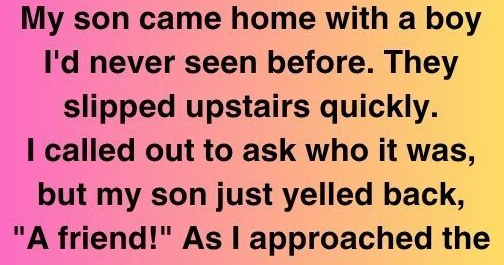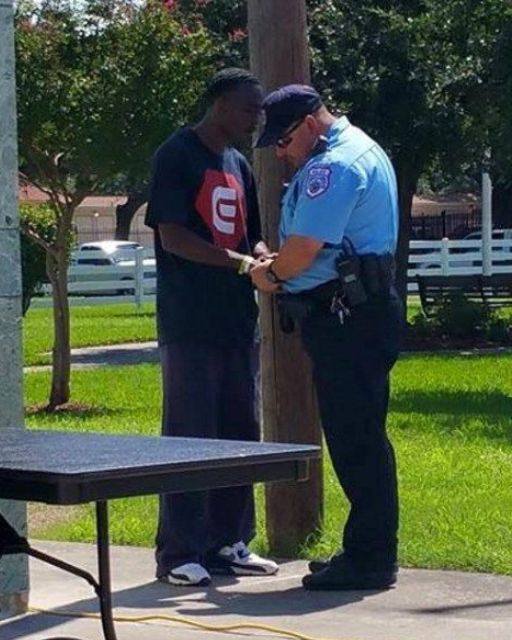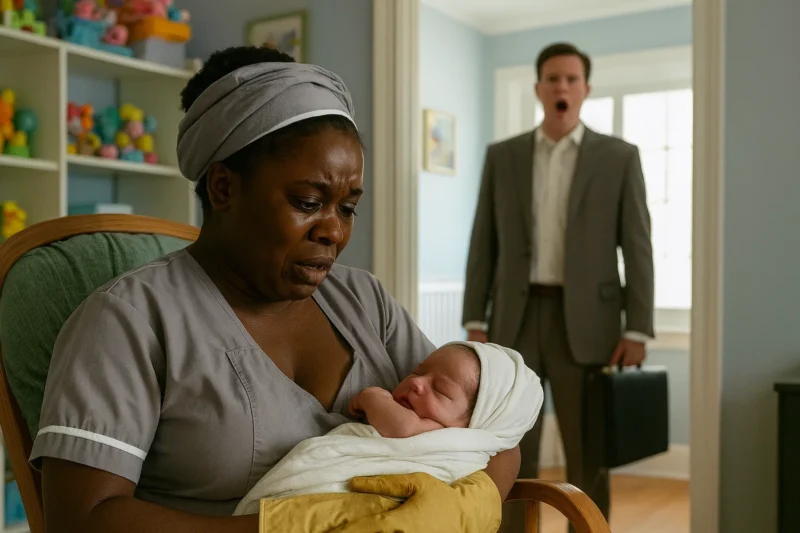One afternoon, my son Marcus arrived home accompanied by a boy I didn’t recognize. They hurried upstairs without a word. Curious, I called after them, asking who the visitor was. Marcus shouted back, “He’s a friend!” As I neared his room, I caught the boy’s voice saying, “Your mom shouldn’t find out about this.” Concerned, I pushed open the door and saw them sitting closely on the bed, peering into a cardboard box. Inside lay a collection of faded photographs, a few wrinkled dollar bills, and a tattered journal.
My immediate reaction was frustration—who was this boy, and why was he encouraging Marcus to hide things? But as I stepped closer, their expressions stopped me. It wasn’t secrecy or mischief in their eyes. It was a blend of sorrow and intrigue.
The boy looked up and said softly, “I’m sorry, ma’am. We weren’t trying to be sneaky. I found this box in my grandpa’s attic. My mom doesn’t know I have it.”
Marcus spoke up, his voice gentle. “Mom, this is Ian. His grandpa lived in that house across from the old train tracks, the one that’s been empty for a while. He passed away last year, and Ian’s mom has been clearing it out.”
I settled on the bed’s edge. “Alright, so what’s in this box that you’re keeping so quiet?”
Ian paused, then carefully lifted the journal. “It belonged to my grandpa. But it’s about someone named Charlie. And a promise he didn’t keep. I think my grandpa carried guilt over it.”
The name Charlie didn’t ring any bells, but Ian’s heavy tone made me listen closely. He opened the journal to the first page, where shaky handwriting read:
“May 3rd, 1971. I should’ve gone back for him.”
Ian turned the pages, revealing scribbled notes, hand-drawn maps, and directions to local spots. There were references to a red bicycle, a baseball glove, and a treehouse behind the Miller farm—places long gone from our town.
I studied the boys. “Does your mom know you have this, Ian?”
He shook his head. “She’d probably toss it. She thinks Grandpa was confused toward the end. But I believe he was trying to share something important.”
The room fell silent for a moment.
Then Marcus spoke. “Mom, we want to solve this. Figure out who Charlie was and what happened. Could you help us?”
And with that, I was drawn into their mystery.
Over the next few days, the journal became the centerpiece of our living room table. After dinner, the three of us would gather, sifting through entries and connecting names to places. Having grown up in this town, I recognized some of the locations mentioned.
“‘Behind the old drive-in screen,’” I read one evening. “That’s likely McPherson’s lot. It was a movie theater before it became a parking lot.”
The following day, I drove Marcus and Ian to the site after school. The screen was long gone, leaving only a rusted pole and cracked concrete. The boys explored while I waited in the car, thinking they’d lose interest soon.
But Marcus came sprinting back. “Mom! You have to see this!”
Hidden behind some wooden pallets was a dented lunchbox. Inside, they found a baseball card, a silver whistle, and a folded note with a single line: “Still waiting for the signal.”
Ian’s eyes widened. “Charlie left this. Maybe he was waiting for my grandpa. Like they had a plan to meet here or run away together.”
This wasn’t just an old man’s scattered thoughts anymore.
That weekend, we followed the journal’s clues to an old oak tree at the town’s edge, where the Miller farm once stood. Now just crumbling sheds and overgrown weeds, it had once been home to a treehouse where kids gathered. The structure was barely intact, but the boys climbed up cautiously.
They returned with a shoebox filled with letters, most written by Charlie, addressed to someone named Nate—Ian’s grandfather.
“Dear Nate,” one letter started. “Mom says we’re moving next week. I don’t want to leave without saying goodbye. You said we’d be blood brothers forever. I’ll wait by the tree at midnight Friday.”
Another, dated a month later, read: “I waited. You didn’t come. I left the baseball card for you. I guess you forgot.”
Ian’s hands shook as he read aloud.
“I think my grandpa never showed up to meet him. And he carried that regret forever.”
That night, Ian stayed over. We ordered pizza and watched a baseball game on TV, the journal and letters resting on the coffee table like an unanswered puzzle.
The next morning brought a turning point.
Ian’s mom called, upset. “They’re selling Grandpa’s house next week,” Ian told us. “Everything in the attic is getting thrown out. I told her about the journal, but she doesn’t care.”
He looked at me. “Should we try to find Charlie’s family? Maybe give them the letters or tell them what happened?”
I nodded. “It could bring someone closure.”
We spent days asking around town—neighbors, churchgoers, anyone who might recall a Charlie from the 1970s. Most couldn’t help; the years had blurred too many memories.
Then Mrs. Harrington, an older neighbor, said something that caught my ear. “I knew a Charles Mattingly. Sweet kid, always playing baseball by the train tracks. His family moved away suddenly. I heard his mom remarried and took him out west.”
It was a clue.
We searched online and combed through town records, eventually finding a Charles Mattingly who’d lived here briefly and now lived in Arizona, a retired teacher.
Ian stared at the computer screen. “Should I call him?”
I looked at him and Marcus. “Only if you feel ready.”
Instead, they wrote a short email, attaching photos of the journal and a few letters.
Two days later, a reply arrived.
Subject: I’ve waited my whole life to read those words.
Charles wrote that he was overwhelmed with emotion. He’d always wondered why Nate never showed up that night. He thought he’d done something wrong or that Nate had moved on. He never heard from him again but never forgot him.
He closed with: “Tell Ian his grandfather was my best friend. And I forgive him.”
Ian broke down in tears.
That weekend, Charles flew to meet us.
He was gentle and soft-spoken, visibly touched by the boys’ efforts. He brought an old photo of two boys on bicycles—one in a baseball cap, the other holding a whistle. “That’s us,” he said.
Charles and Ian sat together for hours, reading the letters. Charles shared stories of their childhood summers—racing trains, fishing at the quarry, sneaking candy into the theater.
“He was always my friend,” Charles said. “Even when he didn’t show up. I just didn’t know why until now.”
We held a small gathering in Ian’s backyard. Neighbors joined us, and Ian’s mom, once dismissive, brought lemonade and set up chairs. Charles gave a brief speech, thanking Marcus and Ian for rediscovering a piece of his past.
Before leaving, Charles handed Ian the photo. “You carry the memory now. And the forgiveness.”
Ian nodded. “I will.”
Months later, Marcus and Ian remained close, their bond deepened by more than school. Marcus grew more reflective, Ian more open. They started a blog called “Letters Left Behind,” a place for people to share stories of lost friendships, unsent letters, and rediscovered memories.
The blog took off. Stories flooded in from across the country—people who never got closure, kids who moved away, adults finding relics in attics. It became a quiet movement, a reminder that healing matters, even years later.
One day, Ian brought home a letter he’d written himself, not from the past but for his grandfather.
He read it to us softly.
“Dear Grandpa,
I found Charlie. I read your words and followed your trail. I brought him back. You couldn’t say sorry, but I did it for you. He forgives you. I think you’d be proud.
Love, Ian.”
Tears filled the room.
Life has a way of tying loose ends together.
Sometimes, those we think are lost forever are waiting for the right story to bring them back. A dusty box in an attic can become a path to healing. And two boys with a journal can teach us about loyalty, regret, and redemption in ways we never imagined.
What I’ve learned is that it’s always worth making things right, even if it’s for someone else.
So check your attics. Ask questions. Send that message. Write that letter.
Some hearts, no matter how long they’ve waited, are still ready to forgive.
If this story touched you, share it with someone who might need hope. And don’t forget to like—it helps others discover this story too.




